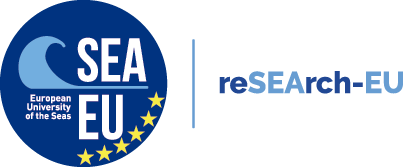The University of Cadiz (UCA), Coordinator of the SEA-EU Alliance, is also in charge of project management as Coordinator in reSEArch-EU.
As Project Coordinator, UCA commits to:
- Be the first point of contact with the European Commission, and specifically with the Research Executive Agency.
- Monitor the appropriate implementation of the reSEArch-EU Project, in compliance with the Grant Agreement and the Consortium Agreement.
- Seek the highest quality standards in every outcome obtained during the project, and submit the deliverables produced during the lifespan of the project.
The project management tasks developed by UCA include:
Project governance: defining reliable, efficient governing bodies
The reSEArch-EU Project works for the improvement of the research infrastructure of the SEA-EU Alliance, and to do so it takes advantage from the latter’s governing structure:
- The (extended) Executive Committee. It is the highest decision-making organ, composed by the members of the SEA-EU Executive Committee and the Vice Rectors of Research.
- The Project Board. It is composed by work-package leaders and technical managers and pays attention to the correct implementation of the project.
- The (extended) Technical Working Group. The SEA-EU Alliance regularly organizes meetings of its technical managers to discuss technical issues. In the same way, the reSEArch-EU Project has its own Technical Working Group, composed by its own technical managers. Both groups may meet when needed to discuss common issues.
- The SEA-EU Subcommittees. To provide support and advice to reSEArch-EU, they may organize meetings with reSEArch-EU participants in different matters:
- The Quality and Ethics Subcommittee (QandES), led by the University of Split.
- The Research, Development and Innovation Subcommittee (RDIS), led by the University of Kiel.
- The Outreach Subcommittee (OS), led by the University of Brest.

More information on the governing structure and procedures adopted in this project may be found in the reSEArch-EU Project Handbook, sent to the European Commission in March 2021.
Internal communication: promoting transparency as the cornerstone of inter-partner relations
To ensure democratic project governance and shared decision making, it is essential the establishment of clear, accessible communication channels so that all partners in the reSEArch-EU Project gets to know what has been decided, how and why.
There are two main communication channels in reSEArch-EU:
- An open-source, online platform, due to host every document produced in the completion of the project.
- Mailing distribution lists, where different groups of participants have been registered and that automatize the submission of messages between project participants.
Quality and ethics: reassuring the highest performance standards in all project’s deliverables
With the collaboration of the University of Split and the SEA-EU Quality and Ethics Subcommittee, this task focuses on the achievement of the highest quality standards in all deliverables of the project.
Within this task, the Data Management Plan, where all procedures related to collection, storing, sharing and publication of research data of the project, was produced and sent to the European Commission in June 2021.

Monitoring and reporting: knowing where we are and what we aim at
Once an enterprise has been planned, it needs to get implemented, and along the way different circumstances may appear that could affect the implementation of those initial plans. For this reason, project monitoring and reporting becomes an essential task, helping to clarify what has been done and what still needs to be done. The reSEArch-EU will produce different types of monitoring reports:
- Internal technical reports.
- Technical and financial reports for the European Commission.
- Open reports for stakeholders and the society.
- Policy briefs on the policies developed by the European Commission in its Horizon programme, drawing from the project’s own experience.
Inter-alliance relations: building bridges with other European Universities
The European Universities Initiative is a pioneer enterprise that intends to transform the Higher Education System in the European Union. In this regard, collaboration between the Alliances that benefit from this programme becomes essential to thrive in an uncertain, challenging environment.
Within the SEA-EU Alliance, it is the reSEArch-EU the place where relations with other Alliances are developed. We have already started to work along with the EU-CONEXUS Alliance for the completion of an inter-alliance agreement that will set the basis for collaboration between the European Universities.

